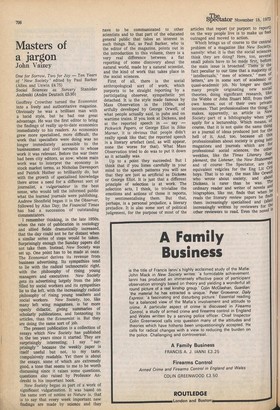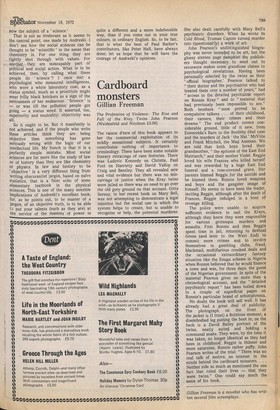Masters of a jargon
John Vaizey
One for Sorrow, Two for Joy — Ten Years of 'New Society' edited by Paul Barker (Allen and Unwin £4.75) Social Sciences as Sorcery Stanislav Andreski (Andre Deutsch £5.95) Geoffrey Crowther turned the Economist into a lively and authoritative magazine. Obviously he was a brilliant man with a lucid style, but he had one great advantage. He was the first editor to bring the findings of really up-to-date economics immediately to his readers. As economics grew more specialised, more difficult, the work that specialists were doing was no longer immediately accessible to the businessmen and civil servants to whose work it was relevant. Before the war there had been city editors, as now, whose main work was to interpret the economy in stock market terms, as Nicholas Davenport and Patrick Hutber so brilliantly do, but with the growth of specialised knowledge there arose a need for a different sort of journalist, a vulgarisateur in the best sense, who would tell the informed public what the learned journals were publishing. Andrew Shonfield began it in the Observer, followed by Alan Day; the Financial Times has had a succession of outstanding commentators.
I remember thinking, in the late 1950s, when the rate of publication in sociology and allied fields dramatically increased, that the day could not be far distant when a similar series of steps would be taken. Surprisingly enough the Sunday papers did not take them. Instead, New Society was set up. One point has to be made at once. The Economist derives its revenue from business advertising. Its sympathies tend to lie with the radical technocratic right, with the philosophy of rising young managers and executives. New Society gets its advertising largely from the jobs filled by social workers and its sympathies lie to the left, with the increasingly radical philosophy of rising young teachers and social workers. New Society, too, like many left wing magazines, is far more openly didactic, giving summaries of scholarly publications, and footnoting its articles, than the Economist is. But they are doing the same sort of job.
The present publication is a collection of essays which New Society has published in the ten years since it started. They are surprisingly interesting; I say " surprisingly" because the weekly paper is itself useful but not, to my taste, compulsively readable. Yet there is about the essays, some of which are extremely good, a tone that seems to me to be worth discussing since it raises some questions, questions also raised by Professor Andreski in his important book.
New Society began as part of a work of significant vulgarisation. It was based on the same sort of notion as Nature is, that is to say that every week important new findings are made by science and they nave to be communicated to other scientists and to that part of the educated general public that takes an interest in such things. But, as Paul Barker, who is the editor of the magazine, points out in the introduction to this volume, there is a very real difference between a fiat reporting of some discovery about the natural world, made by a natural scientist, and the kind of work that takes place in the social sciences.
First of all, there is the social anthropological sort of work, which purports to be straight reporting by a participating observer, sympathetic yet detached. It is the style made famous by Mass Observation in the 1930s, and artfully developed by George Orwell, of what people actually said, in pubs and on wartime trains. If you look at Dickens, and at the reported speech in — say — Pickwick Papers, or George Eliot in Silas Marner, it is obvious that people didn't really speak like that; the reported speech is a literary artefact (and, as will appear, none the worse for that). What Mass Observation tried to do was to put it down as it actually was.
Up to a point they succeeded. But I think that if you listen carefully in your mind to the speech patterns you will see that they are just as artificial as Dickens or George Eliot. It is just that a different principle of selection is at work. The selection acts, I think, to trivialise the emotions and actions of those it reports, by sentimentalising them. But that, perhaps, is a personal prejudice, a literary prejudice. It is also some sort of political judgement, for the purpose of most of the articles that report (or purport to report) on the way people live is to make us feel outraged and moved to action. Which brings us of course to the central problem of a magazine like New Society, namely: what it is that the social sciences think they are doing? Here, too, several small points have to be made first, before the main issue is broached: Thdre'' is the fact peculiar to our time that a majority of 'intellectuals,' 'men of science,' 'men of letters,' are in some sort of academic or quasi-academic job. No longer are there many people originating new social theories, doing significant research, like the Webbs or John Stuart Mill, from their own homes, out of their own private incomes. That professionalises the thing; it makes, apparently, an article in New Society part of a bibliography when you apply for a lectureship. Which means, of course, that it is not quite the same thing as a journal of ideas produced just for the hell of it. And, too, because all this professionalism about society is going int° magazines and journals which are for professional social sciences, the other weeklies, like the Times Literary Supplement, the Listener, the New Statesnlan and of course The Spectator, are the equivalent vehicles for the Eng Lit Crit boys. That is to say, the man like Orwell who wrote about society, and about Dickens, is rarer than he was. VI ordinary reader and writer of novels and biographies, like me, finds that when he reads the literary review papers he finds, them increasingly specialised and WO/ increasingly written by reviewers for tke other reviewers to read. Even the novel is
now the subject of a science.'
That is not as irrelevant as it seems to the central point, one made by Andreski. I don't see how the social sciences can be thought to be ' scientific ' in the sense that chemistry is. For one thing they are rightly shot through with values. For ‘„ another, they are inescapably part of political and social action. What is to be achieved, then, by calling what these people do 'science '? I once met a psychologist who measured intelligences, who wore a white laboratory coat, as a status symbol, much as a prostitute might wear frilly black knickers as a sign of the seriousness of her endeavour. ' Science ' is — or was till the pollution people got going — a status word. It asserted, too, superiority and neutrality; objectivity was all.
So it ought to be. But it manifestly is not achieved, and if the people who write these articles think they are being objective then something has gone seriously wrong with the logic of our intellectual life. My hunch is that it is a Perfectly simple mistake. Most social sciences are far more like the study of law or of history than they are like chemistry Or physics. In law and history to be ' objective ' is a very different thing from writing obscurantist jargon, based on naive statistics, that is a faint echo of some elementary textbook in the physical sciences. This is one of the many sensible implications of Andreski's excellent book; for, as he points out, to be master of a Jargon, of an objective truth, is to be able to put your talents (such as they are) at the service of the masters of power in
quite a different and a more indefensible way, than if you come out in your true colours, in ordinary English. So, to be fair, that is what the best of Paul Barker's contributors, like Peter Hall, have always done; let us hope that he will have the courage of Andreski's opinions.



















































 Previous page
Previous page